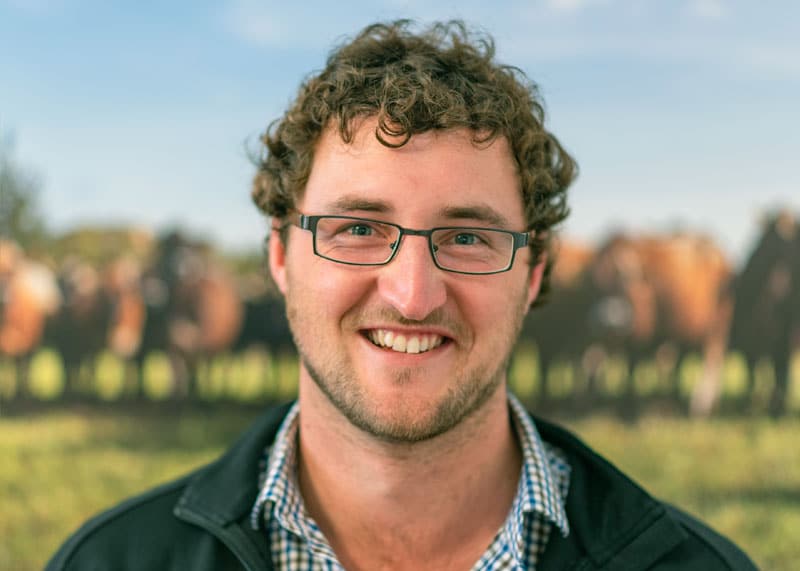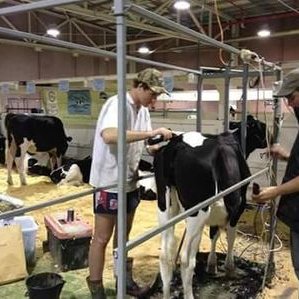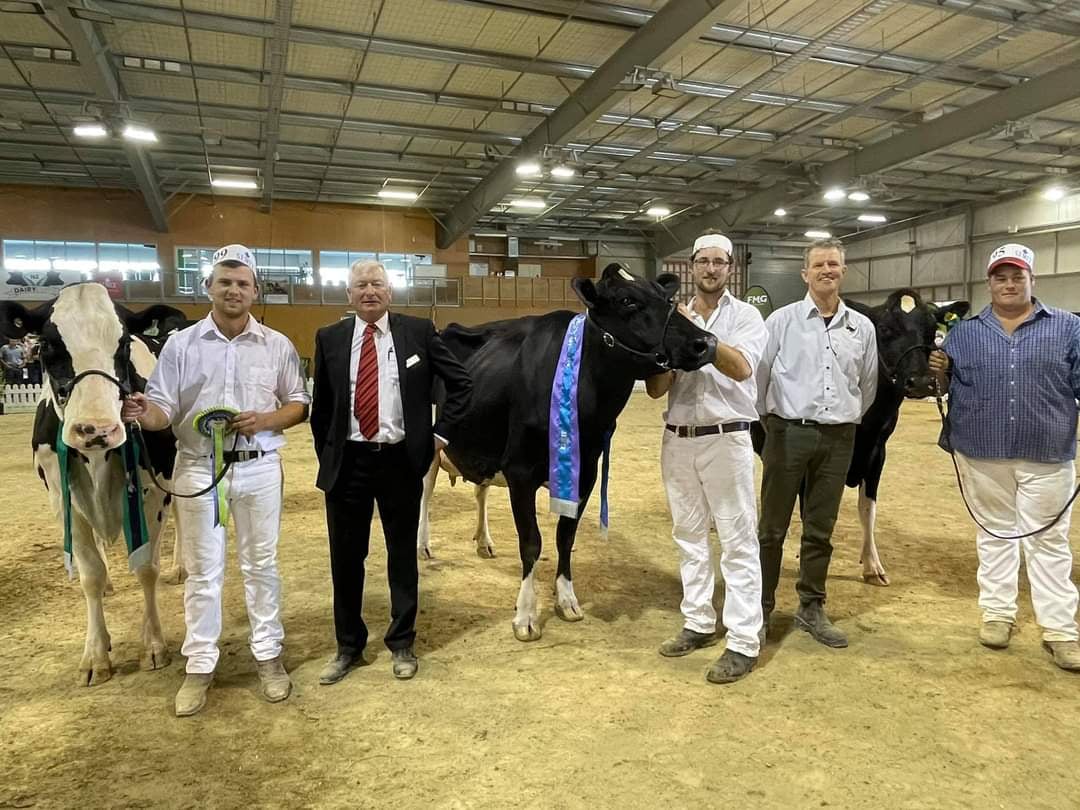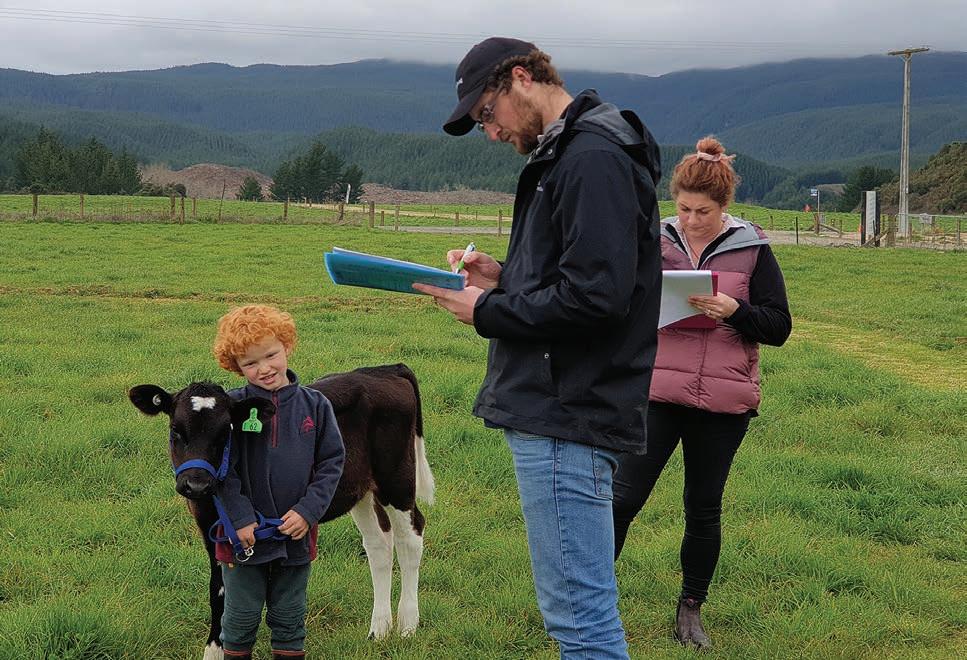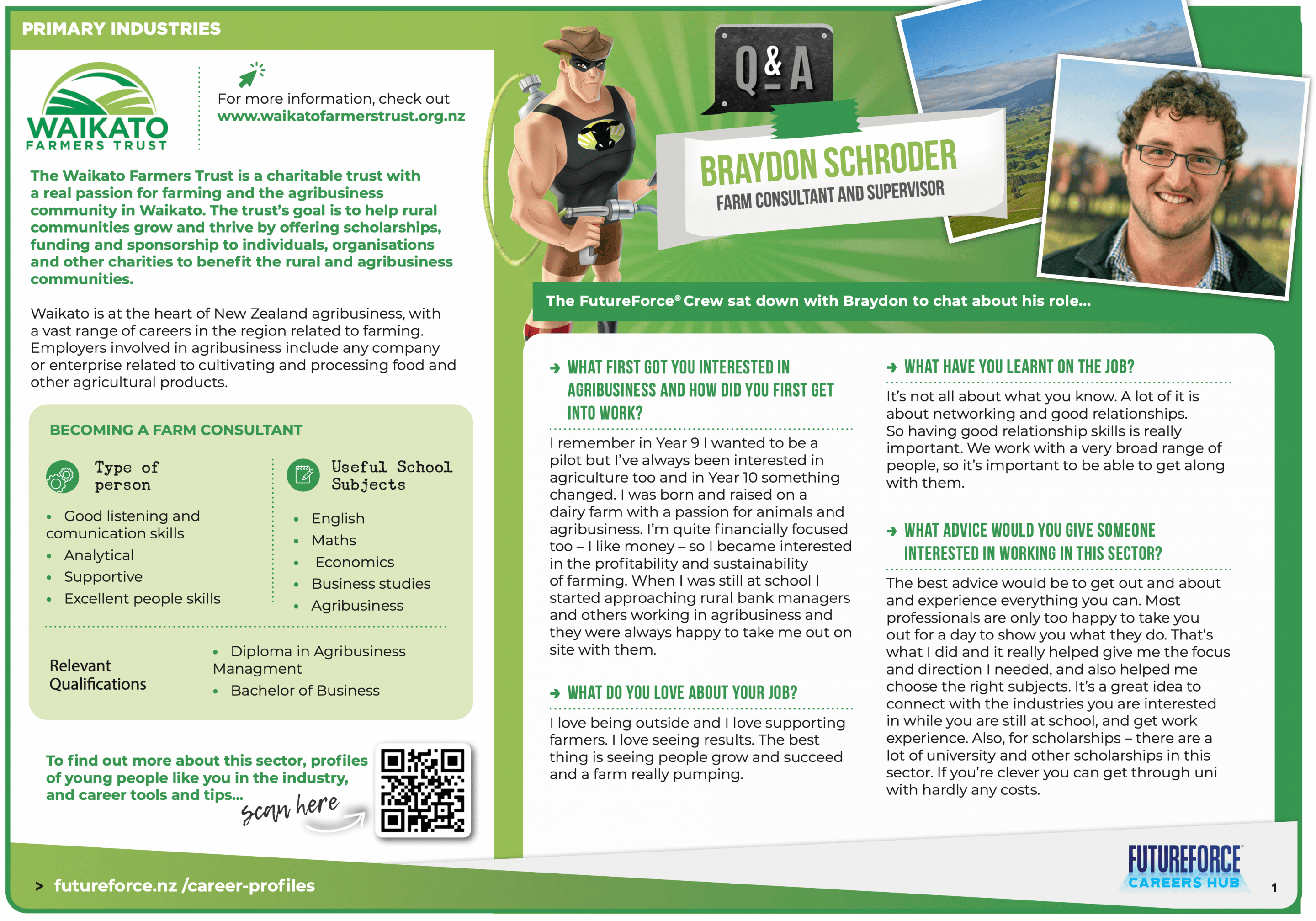

Waikato is at the heart of New Zealand agribusiness, with a vast range of careers in the region related to farming.
Employers involved in agribusiness include any company or enterprise related to cultivating and processing food and other agricultural products (e.g. wool). Examples of such businesses include:
- Farm consultants
- Farm machinery manufacturers
- Seed suppliers
- Agrichemical producers
- Food manufacturers or processors
- Animal feed producers
- Farm product marketers or distributors
Agribusiness careers include farming, operations management, business management, rural analyst, financial analyst, marketing, sales and more.
FutureForce® caught up with Braydon Schroder, a Farm Supervisor and Farm Systems Consultant at Perrin Ag, to find out about his job and what he loves about agribusiness. Braydon has a Bachelor of Agricultural Science, and has won scholarships to tour and work on different farm systems in Canada, North America, Brazil and Australia…
Braydon Schroder
Farm Consultant and
Farm Supervisor
“It’s a great idea to connect with the industries you are interested in while you are still at school, and get work experience. Also, apply for scholarships – there are a lot of university and other scholarships in this sector.”
A Chat with Braydon about his role
Braydon Schroder
Farm Supervisor and Farm Systems Consultant
What first got you interested in agribusiness and how did you first get into work?
I remember in Year 9 I wanted to be a pilot but I’ve always been interested in agriculture too and in Year 10 something changed. I was born and raised on a dairy farm with a passion for animals and agribusiness. I’m quite financially focused too – I like money – so I became interested in the profitability and sustainability of farming. When I was still at school I started approaching rural bank managers and others working in agribusiness and they were always happy to take me out on site with them.
What do you love about your job?
I love being outside and I love supporting farmers. I love seeing results. The best thing is seeing people grow and succeed and a farm really pumping.
What is something important you've learnt on the job?
It’s not all about what you know. A lot of it is about networking and good relationships. So having good relationship skills is really important. We work with a very broad range of people, so it’s important to be able to get along with them.
What sort of person makes a good farm consultant?
You don’t need anything specific, but you do need to be an excellent listener and you need to be supportive. A good farm consultant has excellent analytical and people skills. You need to have a good knowledge base too, but if there’s something you don’t know you can always check with your colleagues or do your research. When I came out of uni I thought you needed to know everything to be a rural professional – you needed to be the expert. But there’s no harm in saying, “I don’t know, but I am going to find out!”
Rural professional roles typically require a tertiary degree at minimum and almost always will require a CV to get a job. Having a CV is also important for scholarships.
What does a day at work look like for you?
This job is so diverse and changes from day to day and week to week. I typically spend two to three days on farm visits and two days in the office catching up on paper work and reporting.
Once a month, I visit the farms I supervise to inspect everything with farm staff and complete all tasks that a farm owner would typically do to ensure the staff have the resources and plans in place to be successful and happy in their roles whilst reporting to the owners.
Ensuring communication between parties and a safe and healthy work place culture are fundamental in this role. Making sure staff are happy and working well together is important, and there is a focus on staff education too.
What helps you keep a good balance between life and work?
Personally, I love planning. That’s who I am. I have a very organised calendar to live by and for me that’s key. I even put in my personal time because it’s important to make that a priority.
Otherwise if I didn’t schedule personal time I would end up working non stop because I enjoy it so much!
What advice would you give somebody interested in this sector?
The best advice would be to get out and about and experience everything you can. Most professionals are only too happy to take you out for a day to show you what they do. That’s what I did and it really helped give me the focus and direction I needed, and also helped me choose the right subjects. It’s a great idea to connect with the industries you are interested in while you are still at school, and get work experience. Also, for scholarships – there are a lot of university and other scholarships in this sector. If you’re clever you can get through uni with hardly any costs.
On the job
What do you do at work?
“I look after five dairy farms and there are different levels of supervision for each, as well as other farm clients for consultancy work. A big part of my role is managing and supporting farm staff, making sure they have all the resources and information they need, and ensuring that there’s a healthy culture on-farm. My job consists of a broad range of things… basically we offer support with anything that goes on at a farm and anything a farm owner would typically do.”
This includes:
- Feed and financial budgeting and monitoring
- Providing advice to farm staff and farm owners
- Managing and supporting staff
- Land use analysis
- Feasibility studies
- Environmental sustainability
- Farm modelling
- Assisting with consents
- Systems modelling
- Business analysis
- Risk management
- Planning
- Reviews
- Farm recruitment
- Facilitating discussion groups
About Waikato Farmers Trust
Waikato Farmer’s Trust’s misson is to empower rural communities through education and encouraging research and excellence in farming. The trust has a passion for agriculture, education and improving the well-being and livelihood of people living in the Waikato region. The trust’s goal is to help rural communities grow and thrive.


